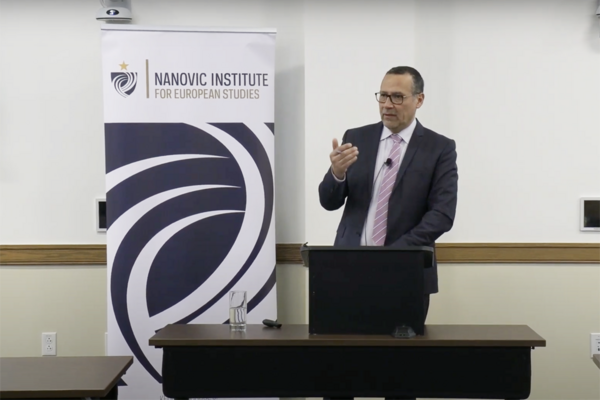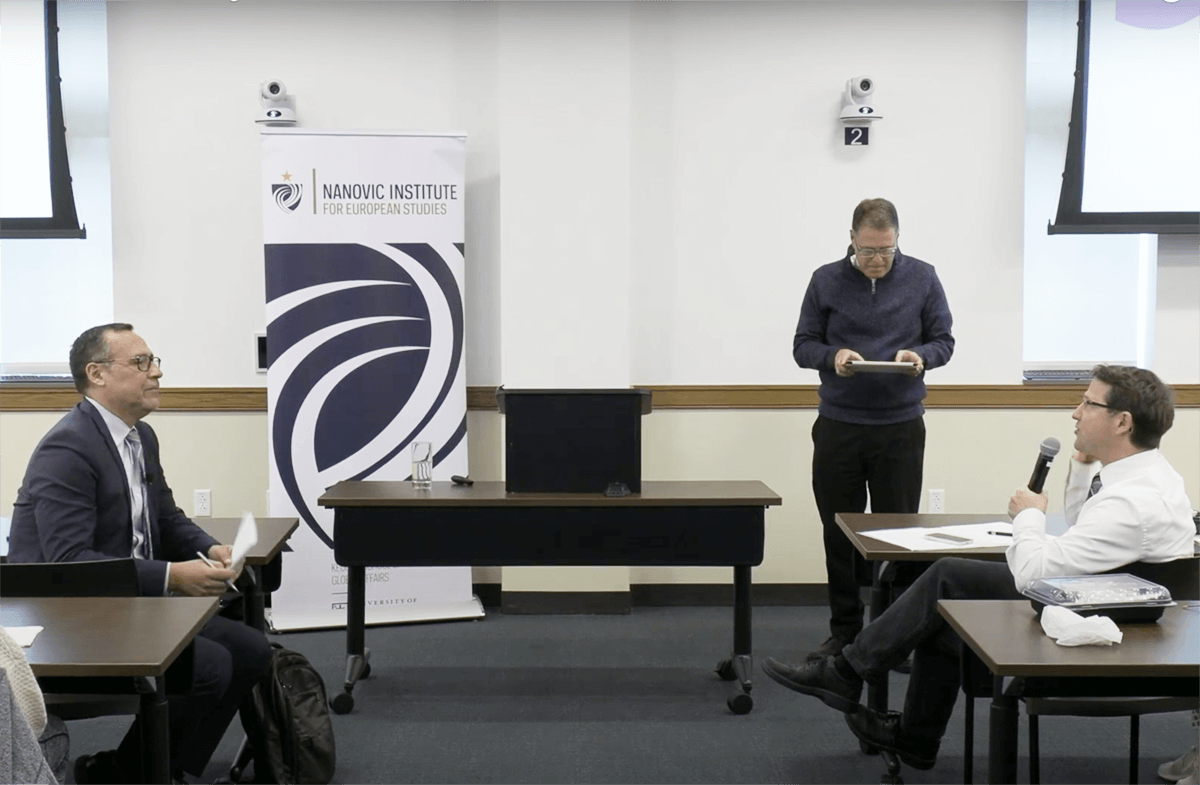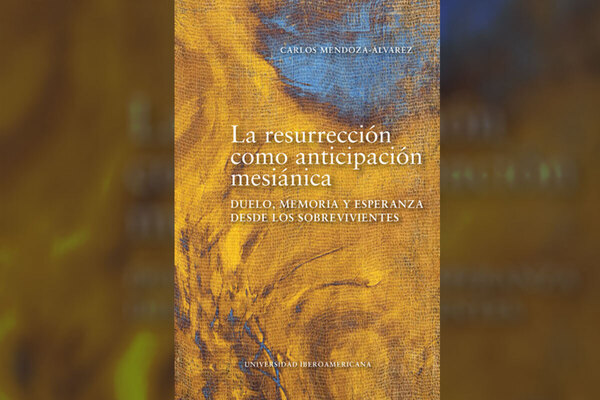Carlos Mendoza-Álvarez is professor of theology at Boston College and Friar of the Order of Preachers. His books include Deus ineffabilis: Una teología posmoderna del fin de los tiempos (2015) and La resurrección como anticipación mesiánica: Duelo, memoria y esperanza desde los sobrevivientes (2020). He is a member of the Board of Directors of Concilium International Journal of Theology. Mendoza-Álvarez delivered the second of a series of lectures on "Decolonizing Scholarship." Hosted by the Nanovic Institute for European Studies, this series will run through the spring ‘23 and fall ‘23 semesters and will feature scholars from various academic disciplines at the top of their fields.
Francisco J. Cintrón Mattei, a third-year Ph.D. student in the Medieval Institute at the University of Notre Dame, has written a summary of Mendoza-Álvarez’s lecture, which may also be re-watched on the Nanovic Institute’s YouTube page.
Watch lecture View Decolonizing Scholarship Poster

On February 24, 2023, Dr. Carlos Mendoza-Álvarez delivered his lecture "Decolonizing Scholarship in Theology: Bodies, Territories, and Knowledges in Resistance." His address began with a brief memory of a prior visit to Notre Dame: a conference with the founders of "liberation theology"—including Professor Gustavo Gutiérrez, who coined the term—where they discussed the Catholic teaching of "the option for the poor" and its wider application for victims, survivors, and the socially excluded.
Decolonizing Christianity?
Mendoza-Álvarez opened the lecture with a question, a central problem to solve: is it possible to decolonize Christianity? He framed the issue within the context of the Second Vatican Council (1962-65) and its modernizing promises of pastoral innovation for the Catholic Church. The Pastoral Constitution Gaudium et Spes, in particular, revealed the seeds of decolonial thinking in Vatican II’s reforms, decentering Eurocentric Christianity as the only frame of reference for thinking about revelation.
This was achieved partly by promoting the life and culture of local churches as full expressions of the universality of the one Church. While Mendoza-Álvarez explained that the final consequences of Vatican II’s decolonial turn have yet to be fully realized, he recalled Pope Francis’s recent exhortation to listen carefully to the social and geographical peripheries.
A mission to prioritize these peripheries guides Mendoza-Álvarez’s approach to decolonizing theological scholarship in the face of our century’s systemic violence. An essential task in this endeavor is recovering the centrality of the bodies, territories, and knowledges (plural) of the people of God on a global scale. In other words, recognizing and embracing the different forms of knowledge contained by communities made invisible by systemic violence. This approach (termed a "decolonial theology") confronts the theological knowledge that ideologically justifies a world of inequality today.
Drawing further from queer and deconstruction theology, Mendoza-Álvarez’s approach seeks to think and act from the viewpoints ("subjectivities") of those denied by such hegemonic world-systems as heteronormative patriarchy, the neocolonialism of globalization, and capitalism.
Decolonial theology therefore not only collaborates with Christian communities that live in resistance amidst the brutality of such world-systems, but also generates theological networks to learn from all who live within the peripheries in resistance to systemic violence.
The “potency” of vulnerability
Mendoza-Álvarez proposed three elements in the decolonization of theological scholarship to analyze the hegemonic systems that assail the world’s economic, social, and cultural processes today. These are the decolonization of theological scholarship in its dimensions related to being (ontology), knowledge (epistemology), and performance.

The ontological dimension requires us to reimagine the vulnerability of victims, he explains. Decolonizing work has revealed the ontological and political power within the historical reality of oppression. The poor and the excluded are not only victims, but possess an inner power to resist via the reinvention of history and the world through their unique experiences. He argued there is a radical power to be found in the "potency" that marginalized communities discover amid the violence they face daily. Through this violence, they find strength and create new “networks of victims who cease to be victims.” Together, they transform their shared suffering into a political and spiritual principle of re-existence.
Mendoza-Álvarez elucidated his point with various examples of modern communities that have reimagined their historical vulnerability in resistance. He discussed, for example, the quilombo settlements in Brazil, where Afro-Diasporic communities actively recreated the collective memory of their enslaved ancestors; in particular, he referenced the memorial and artistic project of the Museu dos Quilombos e Favelas Urbanos in Belo Horizonte, Brazil.
Resisting epistemic wars
The decolonization of theological scholarship also requires an “epistemic conversion.” This process entails listening to other systems of knowledge so as to resolve the asymmetry of knowledge generated by Western intellectual hegemony. It is a process of making visible, problematizing, and reversing the denied knowledge of communities by exploring their own methods of learning within a global ecology of knowledge. Following the Mexican anthropologist Xóchitl Leyva, Mendoza-Álvarez describes the process as a resistance to the epistemic war of capitalism, patriarchy, and racism.
Importantly, Mendoza-Álvarez clarifies that the goal is not to deny the contributions of modern rationality (e.g. science, technology, or human rights). Rather, it must be related to other forms of knowledge, such as the jurisprudence of native peoples, in order to promote a “global cognitive justice.” Such an epistemological turn serves to decolonize the hegemonic techno-scientific knowledge that depredates the planet.
Mendoza-Álvarez furnished numerous examples of epistemological resistance: the creation of popular universities (like the community-run Unitierra Mexico collective) that “deprofessionalize” knowledge; the Forensic Architecture Initiative that investigates networks of corruption in dialogue with the expertise of victims; the Argentinian Group of Forensic Anthropology, which combines forensic anthropology with local knowledge in the investigation of forced disappearances. He stressed how universities can join NGOs and professional guilds to put their knowledge at the service of communities living in resistance.
Knowledge as performativity

A third step in the decolonization of theological scholarship involves moving past language as the focus of university and ecclesiastical theology. Here, the goal is not to diminish the centrality of the written word, but to recover other sites of knowledge—or rationalities—such as living bodies, territories and the practices of communal life. For Mendoza-Álvarez, the elements of orality, aesthetics, and rituality can be combined with the critical category of “performativity” to take account of such rationalities in theological scholarship.
Referencing the resistances of the Mayan and Mixe people, he explained that the disinherited of the land have resorted historically to alternative practices of knowledge. Social movements from the past two decades (e.g. Occupy Wall Street, the Arab Springs, #MeToo, etc.) reveal how the performativity of resistance is a political practice. It permits denied viewpoints—or subjectivities—to affirm their right to difference in public and makes visible the hegemonic practices of machismo, patriarchy, racism, and dominant religious morality.
These performativities seek to propose a new social pact, a new idea of what community is about, Mendoza-Álvarez said. They are not merely symbolic actions, but the political expressions of individuals or communities of liberated, resilient, and “re-existing subjectivities.”
Strategies for decolonizing theological scholarship
Mendoza-Álvarez proposed concrete strategies for decolonizing theological scholarship. These include: instituting new university management policies to diversify the student population, diversifying faculty positions, and transforming the curriculum of traditional disciplines to include epistemic diversity. A recognition of diversity of theories of knowledge permits students and professors to open their horizons to denied local knowledge.
A decolonial theological curriculum should include diverse spiritualities and theologies, embrace new methodological approaches (such as comparative theology and intercultural thinking), and recognize the epistemic status of oral practices and rituals to promote a global cognitive justice.
Christian theology & decolonization
Mendoza-Álvarez reiterated that decolonizing theological scholarship is a process of dismantling the ontological, epistemic, and performative structures of a hegemonic Christianity tied to the colonial epic that began in the late 15th century. This process necessarily combines with the challenge of dismantling global systemic violence and recovering knowledge that has been destroyed or made invisible.
It is crucial to return to the survivors, those who live in the “region of non-being“ of systemic violence, who he describes as the Tzadikkim—the righteous of the nations. They hold the key to the decolonial goal of dismantling ways of thinking that make “the other” invisible. Mendoza-Álvarez concludes that Christian theology, with its narrative of a crucified, powerless God, contains a unique grammar through which to conjugate the verb “decolonize.”

Francisco J. Cintrón Mattei is a third-year Ph.D. student in the Medieval Institute at the University of Notre Dame. His research centers on the legal status of religious minorities in the medieval Mediterranean world, principally the Arabic-speaking Christians of the Iberian Peninsula and the broader Islamic Mediterranean.
Originally published by at eitw.nd.edu on March 21, 2023.